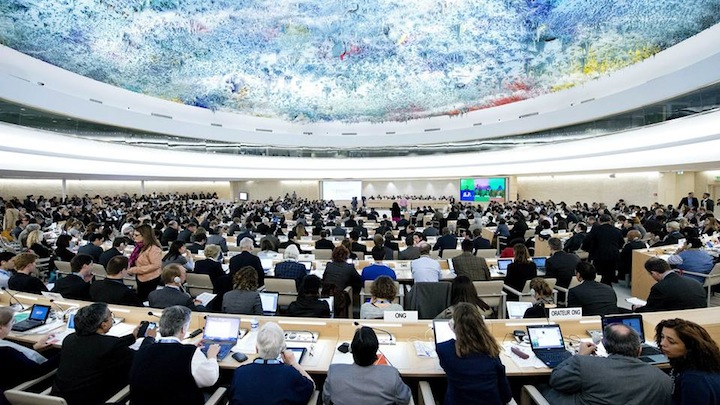The Canadian government and the Asian Centre for Human Rights (ACHR) have called for international action to secure the release of “political prisoners” in the Maldives.
Canada called on the Commonwealth Ministerial Action Group (CMAG) to “urgently put the deteriorating situation in the Maldives on its formal agenda,” while the ACHR called on the the UN Human Rights Council (UNHRC) to adopt a resolution demanding the “unconditional release of all political prisoners” in the Maldives, including former President Mohamed Nasheed and former defence minister Mohamed Nazim.
The ACHR has special consultative status with the UN Economic and Social Council and provides information and complaints to national human rights institutions and the United Nations bodies and mechanisms.
The organization also called on the UNHRC to appoint a Special Rapporteur on the human rights situation in the Maldives and to make a recommendation to the UN General Assembly to suspend the Maldives from the Human Rights Council.
The European parliament in April adopted a resolution condemning the “serious irregularities” of Nasheed’s terrorism trial while US secretary of state John Kerry said during a visit to Sri Lanka that Nasheed was “imprisoned without due process”.
“This is an injustice that needs to be addressed soon,” he said.
Last week, US senators John McCain and Jack Reed urged their government to press for the release of all political prisoners in the Maldives.
Commonwealth values
Canada also called on the Maldivian government to release jailed opposition politicians.
“On June 12, protestors gathered in the Maldives capital, Malé, to call for the release of political prisoners, an independent judiciary, an end to politically motivated charges, and respect for freedom of expression and fundamental democratic values,” Canadian foreign minister Rob Nicholson said in a statement yesterday.
“Canada strongly supports these objectives, which are consistent with Commonwealth values and principles as set out in the Charter of the Commonwealth.”
In March, foreign minister Dunya Maumoon slammed alleged attempts to place the Maldives on the CMAG agenda over Nasheed’s terrorism trial.
Former foreign minister and UN Special Rapporteur on Iran Dr Ahmed Shaheed said Canada’s call shows “that countries in the commonwealth care about the Maldives.”
Suspension from UNHRC
The 29th session of the UNHRC is taking place from June 15 to July 3 in Geneva, Switzerland. The inter-governmental body is comprised of 47 member states and meets for 10 weeks every year, in March, June and September.
The Maldives was first elected to the council in 2010 and re-elected for a second term in November 2013.
The prosecution and imprisonment of political opponents constitute “gross and systematic violations of human rights” as provided under the General Assembly resolution establishing the Human Rights Council and justifies the proposed measures, the ACHR said in a statement yesterday.
As the European parliament has adopted a resolution calling for Nasheed’s release, the ACHR suggested that European Union members on the council should sponsor the resolution.
The foreign ministry said yesterday that the Maldives delegation will focus on “issues of priorities such as women’s rights, children’s rights, climate change, rule of law, among others.”
“Trumped up charges”
The ACHR meanwhile accused President Abdulla Yameen of jailing political opponents under “trumped up charges” to bar rivals from contesting the 2018 presidential election.
“While key democratic leaders have been put behind bars under terrorism charges, President Yameen has taken little or no measures to counter real terrorists: over 200 Maldivians are currently fighting for Islamic State (IS) in Iraq and Syria with at least four of them having died in the fighting,” the ACHR claimed.
The judiciary remains unreformed since the 30-year autocratic reign of former President Maumoon Abdul Gayoom, the ACHR continued, and currently serves as the “handmaiden” of President Yameen – “a replica of the rule by the Rajapaksa brothers which ended in neighbouring Sri Lanka in January 2015.”
Adhaalath Party president Sheikh Imran Abdulla, Jumhooree Party (JP) deputy leader Ameen Ibrahim, and JP council member Sobah Rasheed have also been charged with terrorism and accused of inciting violence at a mass protest on May 1.
The terrorism charges cast doubt on the government’s sincerity in calling for talks with opposition parties, the ACHR suggested.
The organisation noted that Nasheed’s conviction on terrorism charges in March after a 19-day trial was widely criticised over apparent lack of due process.
Amnesty International called the conviction a “travesty of justice” while the UN human rights chief said Nasheed was sentenced after a “hasty and apparently unfair trial” and noted “flagrant irregularities.”
The UN special rapporteur on the independence of judges and lawyers noted “serious due process violations” such as denial of the opportunity to present defence witnesses, which led her to believe “the outcome of the trial may have been pre-determined.”
